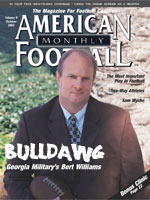AMERICAN FOOTBALL MONTHLY THE #1 RESOURCE FOR FOOTBALL COACHES
Article CategoriesAFM Magazine
|
Full CircleSam Wyche: Comin\' Around Againby: Richard Scott © More from this issue Coaching didn’t appear to be in the cards for Sam Wyche when he took his bonus money from playing in Super Bowl VII with the Washington Redskins and invested in a sporting goods business. Legendary NFL coach and owner Paul Brown had already told Wyche, a career backup quarterback, that he would be a coach someday, but Wyche’s original investment took off and soon grew to 13 retail and wholesale stores in North and South Carolina. Wyche even put his MBA to good use with the chain for about two years before a desire to return to the game just happened to coincide with a call from an old friend. It was Bill Walsh calling to tell Wyche he was about to become the head coach of the San Francisco 49ers, and offering Wyche a chance to join him as an assistant coach i....The full article can only be seen by subscribers. Subscribe today!
|
|
|||||||
| HOME |
MAGAZINE |
SUBSCRIBE | ONLINE COLUMNISTS | COACHING VIDEOS |
Copyright 2025, AmericanFootballMonthly.com
All Rights Reserved





